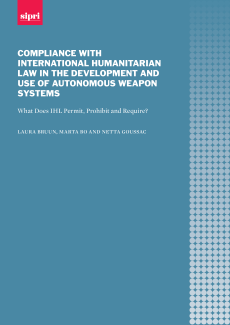Autonomy in weapon systems
Since 2014 the governance of emerging technologies in the area of lethal autonomous weapon systems (LAWS) has been the focus of intergovernmental discussion under the framework of the 1981 Convention on Prohibitions or Restrictions on the Use of Certain Conventional Weapons which may be Deemed to be Excessively Injurious or to have Indiscriminate Effects (the CCW Convention). SIPRI has been contributing to the debate since the beginning and aims to inform states and relevant experts, and generally contribute to more concrete and structured discussions on aspects and implications of the advance of autonomy in weapon systems. SIPRI has produced several authoritative reports and a Reflection Film that takes stock of the challenges posed by autonomy in weapon systems and explores how these challenges might be addressed by states.
SIPRI’s research on autonomous weapon systems explores themes such as (a) what the state and trajectory of underlying technological developments are; (b) what legal, ethical and operational challenges are posed by the advance of autonomy in weapon systems; (c) how these challenges might be addressed through the exercise of human control; and (d) whether and how international humanitarian law places sufficient limits on the development and use of autonomous weapon systems.
SIPRI’s work on autonomous weapons systems has received funding from Canada, Germany, Netherlands, Sweden and Switzerland.








